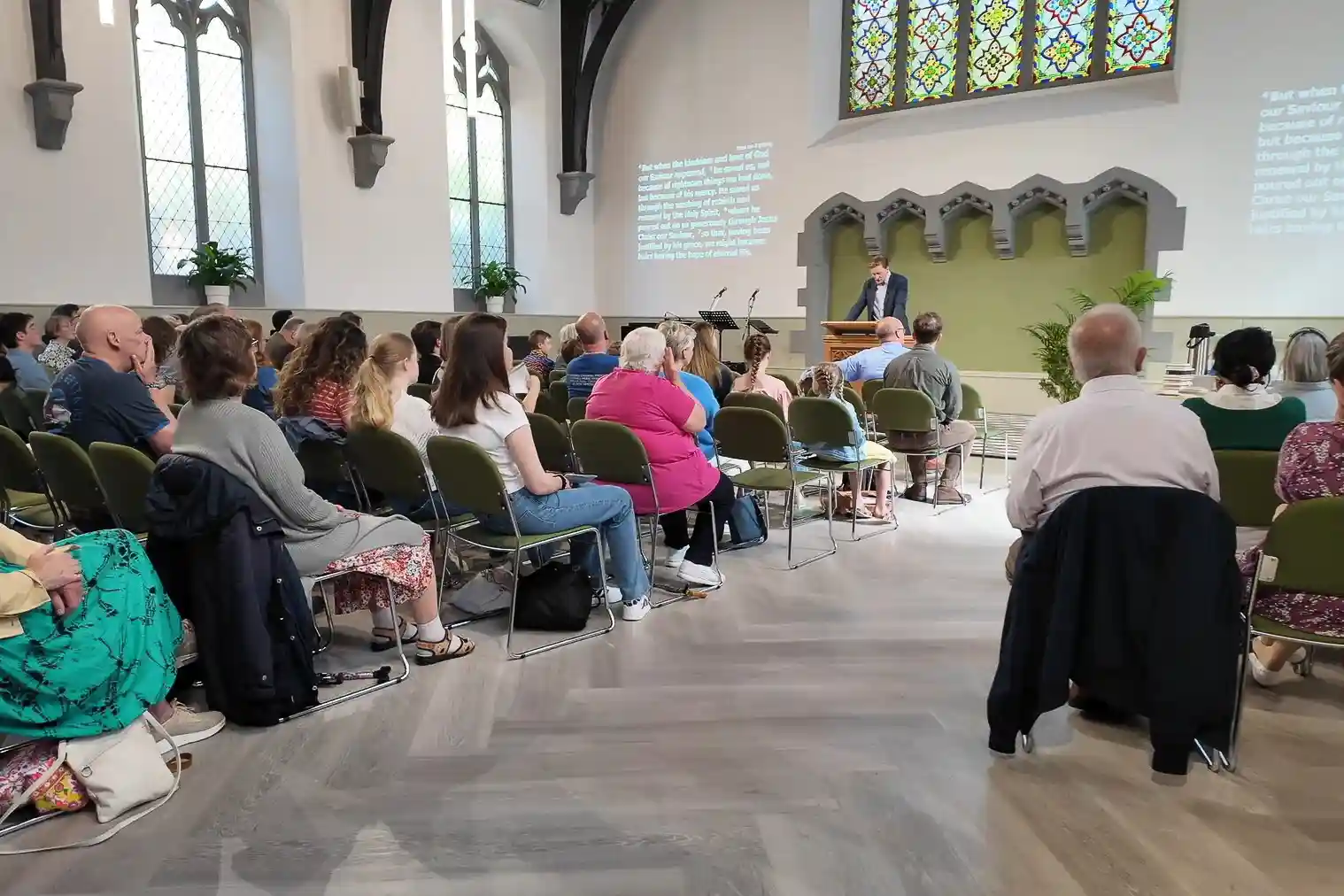Passing on the Faith to the Next Generation

Editor’s Note: This article by MTW Coordinator Lloyd Kim is part of Lausanne’s Theological Foundation Papers, which are organized around 10 key questions identified in the State of the Great Commission Report addressing the critical challenges and opportunities the global church will face by 2050. We invite you to read the overview and full collection at Rooting the Great Commission in Timeless Truth.
A video introduction to this article (embedded below the article due to formatting constrictions) offers insights into the key themes and context of the paper.
Introduction
How does the Bible describe the importance of passing on the faith to the next generation as a fulfillment of the Great Commission? One way to address this question is to consider the consequences of not passing on the faith. In Hebrews 3:7-4:13, the author reflects on the warning given in Psalm 95 and the consequences of hardening our hearts to the good news. Several generations are represented in this passage: the wilderness generation, Joshua’s generation, David’s generation, the author of Hebrews’ generation, and the present-day reader’s generation.1 Each generation is described as having the opportunity to enter into God’s rest by responding to the good news in faith (Heb. 4:2). The urgent pleas given to each generation highlight the importance of passing on the faith to the next generation.
We will first explore the book of Hebrews’ understanding of entering God’s rest and its connection to passing on the faith to the next generation. Then second, we will reflect on the different generations mentioned to illustrate the importance of passing on the faith. Finally, we will discuss the author’s exhortation to us today and its connection to the Great Commission.

Each generation is described as having the opportunity to enter into God’s rest by responding to the good news in faith. The urgent pleas given to each generation highlight the importance of passing on the faith to the next generation.
I. God’s Rest and Passing on the Faith
How is entering God’s rest related to passing on the faith? Let’s first explore what is meant by God’s rest. In his exegesis of Psalm 95, the author connects “my rest” mentioned in Hebrews 3:11 with God’s Sabbath rest in Genesis 2:2.2 Hebrews 4:9-10 says, “There remains, then, a Sabbath-rest for the people of God; for anyone who enters God’s rest also rests from their works, just as God did from his.”3 The author is arguing that there is an eschatological rest that is available for God’s people after they have completed their work.4
What was mankind’s work? Before the fall, mankind was commanded to “[B]e fruitful and increase in number, fill the earth and subdue it. Rule over the fish of the sea and the birds in the sky and over every living creature that moves on the ground” (Gen. 1:28). As pre-fall mankind, made in the image of God (Gen. 1:26), multiplies and exercises God’s dominion, the glory and rule of God fills the earth.5 This is a picture of the kingdom of God filling the world.6 When this work is complete, mankind would enter God’s Sabbath rest, just as God rested from his works.7
This work of building God’s kingdom here on earth as it is in heaven continued even after the fall of Adam. However, being fruitful and multiplying was not enough because of mankind’s fallen condition. God’s people had to pass on the faith to the next generation, encouraging trust and obedience to God’s words. The author of Hebrews highlights this in his exegesis of Psalm 95.

This work of building God’s kingdom here on earth as it is in heaven continued even after the fall of Adam. However, being fruitful and multiplying was not enough because of mankind’s fallen condition.
II. Generational Examples of Passing on the Faith
A. The Wilderness Generation
In his quote of Psalm 95:7-11, the author warns his own generation not to be like the wilderness generation. They heard God’s voice, but rebelled.8 And because of their unbelief and disobedience, they were not able to enter God’s rest, which meant exclusion from the promised land.9 Numbers 14 describes the good report that Joshua and Caleb gave after spying in the land of Canaan.10 But the people did not believe the promises, grumbled against Moses, and talked about stoning him.11
If it were not for Moses’ intercession, God would have destroyed the generation immediately.12 He forgives them, but also makes this oath, “not one of them will ever see the land I promised on oath to their ancestors. No one who has treated me with contempt will ever see it” (Num. 14:23).13 The consequences of unbelief and disobedience to the good news were severe. The people were excluded from the promised land and the kingdom God would establish there.14 This highlights the importance of passing on the faith to the next generation.
B. Joshua’s Generation
The author also references Joshua’s generation.15 The book of Joshua describes the conquest of the land of Canaan and the Lord giving Israel “rest on every side” (Josh. 21:44). God had given his people victory over their enemies, rest from war, and peace in the promised land. But if they had already entered God’s rest at the time of Joshua, why would David in Psalm 95 speak of entering God’s rest in his day?16 This points to the fact that the rest Joshua gave God’s people in the land of Canaan was only a shadow of God’s sabbath rest that is still open for God’s people to enter.17
While Joshua’s generation did experience a foretaste of God’s sabbath rest, it was not permanent. The following generation did not experience God’s rest. The book of Judges describes that generation’s failure to secure rest in the promised land.18 After Joshua died, the subsequent generation did not continue in faith, but hardened their hearts and went astray.19 This also highlights the importance of passing on the faith to the next generation.

Today if only you would hear his voice, ‘Do not harden your hearts…’”. The author of Hebrews recognizes that David was also preaching the good news to his generation.
C. David’s Generation
David writes Psalm 95 as an invitation to worship but also gives a warning. In verses 1-7a he calls God’s people to worship the Lord, the Rock of our salvation, the great God, the great King above all gods, our Maker, and Shepherd. Embedded in this call to worship is the good news that “He is our God and we are the people of his pasture, the flock under his care” (Ps. 95:7).20
After David shares this invitation to come before the Lord, he gives a warning, “Today if only you would hear his voice, ‘Do not harden your hearts…’” (Ps. 95:7-8). The author of Hebrews recognizes that David was also preaching the good news to his generation. “God again set a certain day, calling it ‘Today.’ This he did when a long time later he spoke through David, as in the passage already quoted” (Heb. 4:7). The fact that David is warning his generation not to harden their hearts to the good news of the kingdom (Ps. 95:8-10) shows the importance of passing on the faith to the next generation.
Author of Hebrews’ Generation
The author of Hebrews is speaking to those who are tempted to revert back to Judaism.21 The primary argument of this letter is that Jesus is better.22 He is greater than Joshua in giving us victory (rest) over our enemies of sin, death, and the devil.23 He is greater than David, in receiving all authority in heaven and on earth and establishing the kingdom of God by his perfect righteousness and obedience.24 Jesus establishes a better priesthood, covenant, and sacrifice.25 He is the one who secures our rest by finishing the redemptive work the Father has given him. In light of the revelation of Jesus Christ, the author amplifies the warning of Psalm 95 and the promises God offers his generation.
- Warning
In Heb. 3:7 the author introduces Psalm 95 with “So, as the Holy Spirit says….” He sees God speaking to his generation through the very Spirit of Christ26 and applies Psalm 95’s warning directly to his readers. “See to it brothers and sisters, that none of you has a sinful, unbelieving heart that turns away from the living God” (Heb. 3:12). The author also picks up on the Psalm’s use of the word “today.”27 He writes, “But encourage one another daily, as long as it is called ‘Today,’ so that none of you may be hardened by sin’s deceitfulness” (Heb. 3:13). Just as past generations needed to respond to the good news by faith,28 his generation also needs to respond “today”!
The author ends his exegesis with a picture of the word of God as a sword that lays bare the “thoughts and attitudes of the heart” (Heb. 4:12). He is again bringing us before the presence of God to hear his words. We are exposed before the one to whom we must give an account.29 This terrifying picture is appropriate because of what is at stake. To be excluded from God’s eschatological Sabbath rest is far worse than being excluded from the land of Canaan. In this way, he underlines the importance of passing on the faith to the next generation. - Promise
At the same time, the author of Hebrews is also amplifying the blessing of the promise of God. Entering God’s rest is more than simply entering Canaan. The author of Hebrews explains that what is open for us is God’s eschatological sabbath rest.30 This is the reward for those who persevere in faith.
The previous generations “did not receive the things promised; they only saw them and welcomed them from a distance…” (Heb. 11:13). The author of Hebrews is trying to communicate to his generation the incredible privilege they have because of Jesus’ redemptive work for them. In contrast to those in the past who did not receive the ultimate fulfillment of God’s promises, his generation has received the promises in Christ (Heb. 11:39-12:2).31 In this way, the importance of passing on the faith to the next generation is also amplified.
III. Author’s Exhortation and the Great Commission
Hebrews speaks to us today and to every generation that follows until the return of our Lord. The urgency of passing on of the faith to the next generation is highlighted by the consequences of hardening our hearts in unbelief and the rewards of the promised blessings for those who persevere in faith.
What are the implications for us today? God’s plan is for his creation to be filled with his glory and dominion.32 How then can God’s original purpose for his creation be fulfilled? How can his kingdom fill the earth? It is through the Great Commission.33
The author of Hebrews understands that we have work yet to do before we can enter into God’s final Sabbath rest.34 The work of the Great Commission is the means God uses to lead people all over the world to trust and obey the gospel of the kingdom. The two principal tasks associated with making disciples of all nations are baptizing and teaching.35
What do we do when we baptize someone? We lead them to trust and believe in the good news of Jesus Christ and receive the sign and seal of inclusion into the community of faith. What do we do when we teach them to obey everything that Jesus commands? We lead them to live out the ethics of the kingdom of God as the fruit of the good news they received. As Christians live out the ethics of the kingdom of God, the rule and reign of Christ are here on earth as it is in heaven.
The more disciples that are made among the nations the more Satan’s kingdom is destroyed and the more the Kingdom of God advances. The glory and dominion of God fills the earth as we bear witness to Jesus from Jerusalem, Judea, and Samaria, and to the ends of the earth.36 And when this work is complete, and the full number of God’s people have received Jesus as Lord and Savior, our King will return and we will experience God’s sabbath rest – not by faith, but by sight.37 This complete rest is God’s ultimate purpose for us.

We now have been handed the baton to pass on this same good news of the kingdom to subsequent generations. Jesus has completed the work of salvation on our behalf and invites us to join him in his continuing work of drawing all peoples to himself.
Conclusion
We now have been handed the baton to pass on this same good news of the kingdom to subsequent generations. Jesus has completed the work of salvation on our behalf and invites us to join him in his continuing work of drawing all peoples to himself. What is at stake are the eternal consequences of unbelief and disobedience versus the reward of eternal life in the kingdom of God. So, let us warn those from every tribe, tongue, and nation to not harden their hearts and invite them to enter into God’s Sabbath rest by faith in Jesus Christ. Let us take the baton of making disciples of all nations until the day our Lord returns.
“So, as the Holy Spirit says: ‘Today, if you hear his voice, do not harden your hearts’…” (Heb. 3:7-8).
Endnotes
- Heb. 3:12-4:13.
- Heb. 4:3-4 (NIV), “Now we who have believed enter that rest, just as God has said, ‘So I declared on oath in my anger, they shall never enter my rest.’ And yet his works have been finished since the creation of the world. For somewhere he has spoken about the seventh day in these words: ‘On the seventh day God rested from all his works.’”
- All Biblical quotes are from the New International Version (NIV).
- “It is Ps. 95 that calls for an eschatological understanding of κατάπαυσις, ‘rest.’ The admonition in Ps. 95:7b–8a is both an urgent call to the people of God and an announcement of the eschatological time of salvation. That time has come. It is the final period of redemptive history, which has begun with the speaking of God through his Son (1:1–2a),” [William L. Lane, Hebrews 1–8, vol. 47A, Word Biblical Commentary (Dallas: Word, Incorporated, 1991), 101].
- “Man as created was already crowned with glory and honor, for made in the likeness of the enthroned Glory, a little lower than the angels of the divine council, man was invested with official authority to exercise dominion as priest-king in God’s earthly courts. Yet, the glory of man’s royal functioning would be progressive as he increasingly fulfilled his historical task of subduing the earth, his ultimate attainment of functional glory awaiting the eschatological glorification of his whole nature after the image of the radiant Glory-Spirit. Ethical glory also belonged to man as created and in this respect man would have gone from glory to glory had he not sinned, moving on from a state of simple righteousness to one of confirmed righteousness” [Meredith G. Kline, “Creation in the Image of the Glory-Spirit,” WTJ 39:2 (Spring 1977): 250-272].
- The Genesis 1 creation account is cast in a parallel structure that highlights a “kingdoms and kings” motif. God created kingdoms in days 1-3 (light/darkness, sky/sea, land) and kings to rule over those kingdoms in days 4-6 (sun/moon and stars, birds/fish, land creatures) with the climax of his creation being mankind. See Meredith G. Kline, “Because It Had Not Rained,” WTJ 20.2 (May 1958): 146-57.
- Our present-day practice of Sabbath keeping is a foretaste of what is to come. We rest from our work and worship our creator God each week.
- Heb. 3:16.
- Heb. 3:18-19.
- Num. 14:6-8, “Joshua son of Nun and Caleb son of Jephunneh, who were among those who had explored the land, tore their clothes and said to the entire Israelite assembly, ‘The land we passed through and explored is exceedingly good. If the Lord is pleased with us, he will lead us into that land, a land flowing with milk and honey, and will give it to us.’”
- Num. 14:10.
- Num. 14:11-20.
- Entering God’s rest for the wilderness generation meant occupying the land of Canaan. The promised land of Canaan was a type of the heavenly promised land, which is another picture of God’s Sabbath rest (Heb. 11:13-16; 12:22).
- The Kingdom of Israel was a foreshadowing of the kingdom of God.
- Joshua was in the wilderness with those who hardened their hearts, but also led the subsequent generation into the promised land (Josh. 1:1-6).
- Heb 4:8, “For if Joshua had given them rest, God would not have spoken about another day.”
- “Accordingly, the experience of rest in Canaan was only a type or symbol of the complete rest that God intended for his people, which was prefigured in the Sabbath rest of God, according to Gen. 2:2” [Lane, Hebrews 1–8, vol. 47A, 101].
- Judg. 1:27-36.
- Judg. 2:10-13, “After that whole generation had been gathered to their ancestors, another generation grew up who knew neither the Lord nor what he had done for Israel. Then the Israelites did evil in the eyes of the Lord and served the Baals. They forsook the Lord, the God of their ancestors, who had brought them out of Egypt. They followed and worshiped various gods of the peoples around them. They aroused the Lord’s anger because they forsook him and served Baal and the Ashtoreths.”
- Hebrews picks up on Jeremiah’s prophecy of a new covenant where God says, “I will put my laws in their minds and write them on their hearts. I will be their God, and they will be my people” (Heb. 8:10; Cf. Jer. 31:31-34).
- See Arthur Walkington Pink, An Exposition of Hebrews (Swengel, PA: Bible Truth Depot, 1954), 6.
- “Therefore, the method followed by the Holy Spirit in this Epistle, in developing its dominant theme, is to show the immeasurable superiority of Christ over all that had gone before” [Pink, An Exposition of Hebrews, 7].
- Heb. 4:8; 12:1-2.
- Heb. 1:3, 13; 8:1; 10:12-13; 12:2, 28; Matt. 28:18.
- Jesus has a better priesthood (Heb. 7:11-28), a better covenant (Heb. 8:1-13), and a better sacrifice (Heb. 10:1-18).
- Heb. 1:2.
- Heb. 3:7-8, “Today, if you hear his voice, do not harden your hearts as you did in the rebellion…” Cf. Heb. 4:7-8.
- Heb. 4:2, “For we also have had the good news proclaimed to us, just as they did; but the message they heard was of no value to them, because they did not share the faith of those who obeyed.”
- In context, the force of v 13 is to assert that exposure to the word of Scripture entails exposure to God himself” [Lane, Hebrews 1–8, vol. 47A,103]. Cf. Heb. 4:13.
- Heb. 4:9.
- “This promise refers to Christ’s coming in the flesh and his accomplishing his work of our redemption. This promise was made to the elders from the beginning of the world. It was not actually fulfilled until ‘the fullness of time’” [John Owen, Hebrews, Crossway Classic Commentaries (Wheaton, IL: Crossway Books, 1998), 239].
- Our Lord teaches us to pray, “your kingdom come, your will be done on earth as it is in heaven” (Matt. 6:10).
- Matt. 28:18-20.
- It is true that believers can enter God’s rest even now by faith (Heb. 4:3), but there will be a time when the work of filling God’s creation with his glory and dominion will be completed. At that time, we will enter God’s final Sabbath rest (Heb. 4:9-10).
- Matt. 28:19-20.
- Acts 1:8.
- Matt. 24:14; Rom. 11:25-26.








